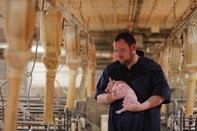
Pork producers need to comply with strict animal welfare, quality assurance and traceability standards to be able to use the Pork 360 quality assurance mark.
Amongst others, a person needs to be identified to take charge of the implementation and maintenance of the Quality Assurance and Traceability program and also inform the South African Pork Producers Organisation (SAPPO) of any changes in farm details.
Standard operating procedures need to be developed that comply with the Pork 360 regulations, with the master file being contained in the piggery office. A list of registers used on the farm, laboratory results, health plans, prescriptions and other documents, including delivery notes and invoices for medicines should all be filed and available for inspection.
This person is also responsible for ensuring that employees have the necessary training to implement the standard operating procedures, for example, in terms of animal handling, cleaning and sanitation, euthanasia, feed monitoring, medicine, needle and syringe control and recording, personal hygiene, pest control and routine maintenance and filling of checklists.
Strict access control is required to ensure good biosecurity measures, which helps to reduce disease risks. As such all pig production units or areas need to be totally fenced off and access gates should be locked at all times. The production areas should be clearly marked as a biosecurity area and no domestic animals and unauthorised vehicles or people should be allowed on the premises.
Logs should be kept of all vehicles, people and pigs entering and leaving the farm, and strict biosecurity and sanitation measures should be used to reduce the threat of these vehicles and people. Strict measures should also be in place to ensure workers have access to a safe environment and do not pose any disease risks.
In terms of pest and disease management, a comprehensive plan should be in place with good records kept of any taken interventions. Only products that are registered for use are allowed and these should be used correctly and according to the instructions.
Pigs should have access to an adequate supply of clean water and may, under no circumstances, receive kitchen, ship, hospital, canteen, restaurant or any other type of swill or raw material that contains animal offal or dead animal material. Feed should comply with certain standards, with a sample of every ration taken, recorded and stored for three months for traceability purposes.
 SouthAfrica.co.za offers a guide to pig farming in South Africa. The commercial pig industry in South Africa is relatively small with a few ...
SouthAfrica.co.za offers a guide to pig farming in South Africa. The commercial pig industry in South Africa is relatively small with a few ...